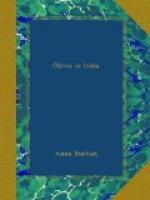I am not going to write any more, not because I haven’t lots to say, but because writing much or talking much about a thing—being queer and Scots, it is hard for me to say love—seems somehow to cheapen it, profane it.
I have opened this just to say again, My dear, my dear!
Calcutta, April 21.
... only three more days in India, and I don’t know whether I am horribly sorry to go or profoundly relieved to get away. There is no doubt it is a sudden and dangerous country. Three people we knew have died suddenly of cholera, and two others have had bombs thrown at them. I shall be thankful to find myself safely on board the steamer, but even if I escape I am leaving Boggley in the midst of these perils. Not that he lets the thought of them vex his soul. You learn, he says, to look upon death in a different way in India, but I am sure I never could learn to regard with equanimity the thought of being quite well one day and being hurried away to the Circular Road Cemetery early the next. It is sad to die in a foreign land, and it is somehow specially sad, at least I think so, for a home-loving Scot to lie away from home.
“Tell me not the good and wise
Care not where their dust reposes.
That to him who sleeping lies
Desert rocks shall seem as roses.
I’ve been happy above ground,
I could ne’er be happy under,
Out of Teviot’s gentle sound.
Part us, then, not far asunder.”
Yesterday I saw a pathetic sight. A couple in a tikka-gharry; the man a soldier, a Gordon Highlander, and on the front seat a tiny coffin. The man’s arm was round the woman’s shoulder, and she was crying bitterly. A bit of shabby crape was tied round her hat, and she carried a sad little wreath.




